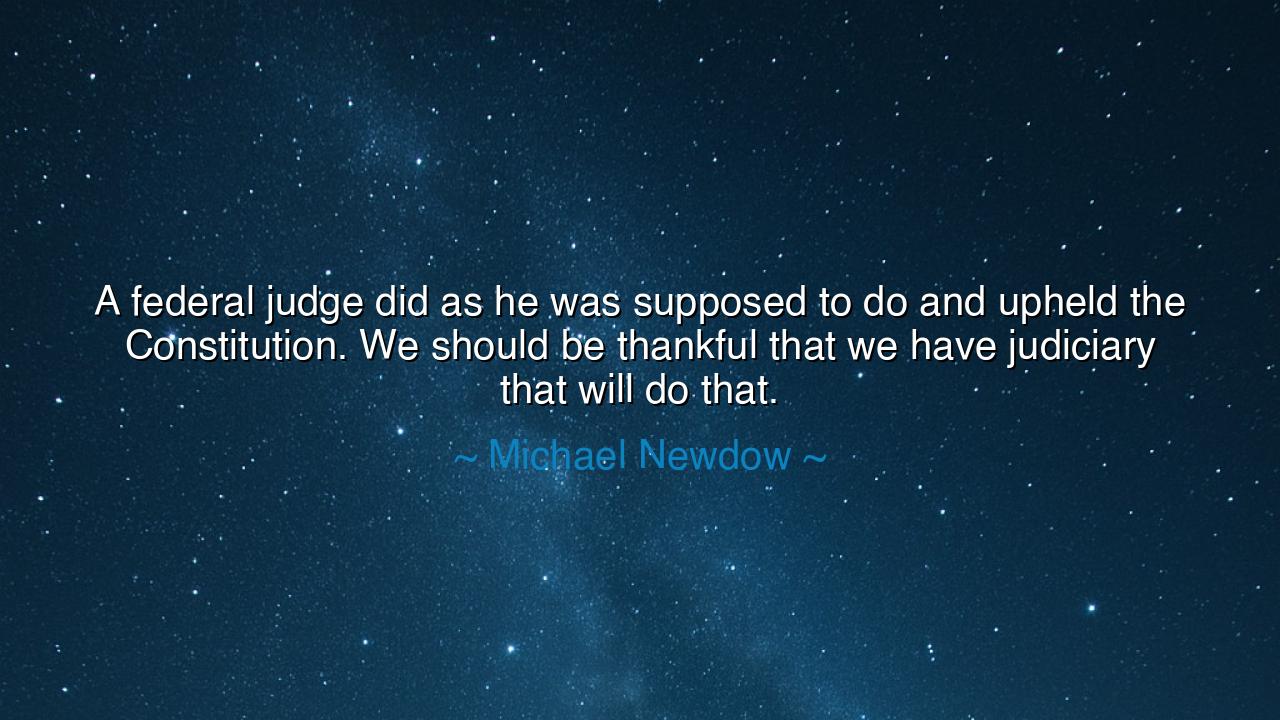
A federal judge did as he was supposed to do and upheld the
A federal judge did as he was supposed to do and upheld the Constitution. We should be thankful that we have judiciary that will do that.






Michael Newdow once spoke with the solemn weight of civic devotion: “A federal judge did as he was supposed to do and upheld the Constitution. We should be thankful that we have judiciary that will do that.” In these words we hear no idle praise, but the reverent acknowledgment that a people’s freedom rests not on the whims of power, but on the steadfast guardianship of law. His gratitude is not for a single ruling alone, but for the living strength of a system that dares to bind even rulers beneath the yoke of justice.
The origin of this statement lies in Newdow’s own battles concerning the separation of church and state, battles that carried him into the highest courts of the land. His struggles reminded him—and all who listened—that the Constitution is not merely ink on parchment but a covenant, one that requires faithful defenders in the courts of justice. When he spoke of a federal judge upholding it, he was giving voice to a truth the ancients themselves knew: that liberty endures only so long as there are those who honor law above desire, principle above convenience.
The ancients gave us many such examples. In Rome, when Julius Caesar sought to place himself above the Republic, it was the senators and defenders of law who tried—though at great cost—to restrain his ambition. In Athens, the trial of Socrates revealed both the strength and the peril of democracy when law is wielded unjustly. In every age, the tension has been the same: will the law remain the shield of the people, or will it bend to the will of the mighty? Newdow’s thankfulness springs from seeing a judge stand firm, a reminder that in America, as in the best traditions of old, law still binds power.
His words are also a call to humility and vigilance. For the judiciary, when true to its duty, is not a servant of politics or passion but of the enduring principles set forth in the Constitution. To be thankful for such fidelity is to recognize how rare and precious it is. Many nations throughout history have faltered when their judges became the tools of tyrants, or when law was written only to serve the powerful. To have judges who uphold principle even when unpopular is to possess a treasure greater than gold, for it is the foundation of liberty itself.
Consider also the example of Chief Justice John Marshall, who in Marbury v. Madison established the principle of judicial review. In that moment, the judiciary claimed not power for itself, but responsibility: the solemn charge to ensure that no branch of government stray beyond the boundaries of the Constitution. Without such courage, America’s system would have crumbled into chaos or tyranny. Newdow’s statement carries this same spirit—thankfulness that judges still walk in the path laid by those who came before, guarding the covenant of law.
The lesson is clear: freedom is not sustained by words alone, but by the courage of those who uphold them. A people must cherish their judiciary not when it rules in their favor alone, but when it proves faithful to the principles that safeguard all, even in the face of controversy. For it is easy to praise judges who affirm our desires; it is far harder, yet more necessary, to be thankful when they uphold the law against the tide of passion.
Practical action follows. As citizens, we must educate ourselves in the principles of the Constitution, so that we may recognize and honor when they are upheld. We must protect the independence of the judiciary, resisting those who would corrupt it for gain. And we must cultivate gratitude, as Newdow did, for each moment when the courts stand firm, for such moments are the quiet victories that preserve liberty for generations.
Thus, Michael Newdow’s words endure as a teaching: that the strength of a nation lies not in the splendor of its armies nor the wealth of its markets, but in the faithfulness of its judges to the Constitution. To be thankful for this is to honor the foundation of freedom itself, and to pass on to our descendants not only rights, but the example of gratitude for those who protect them.






AAdministratorAdministrator
Welcome, honored guests. Please leave a comment, we will respond soon